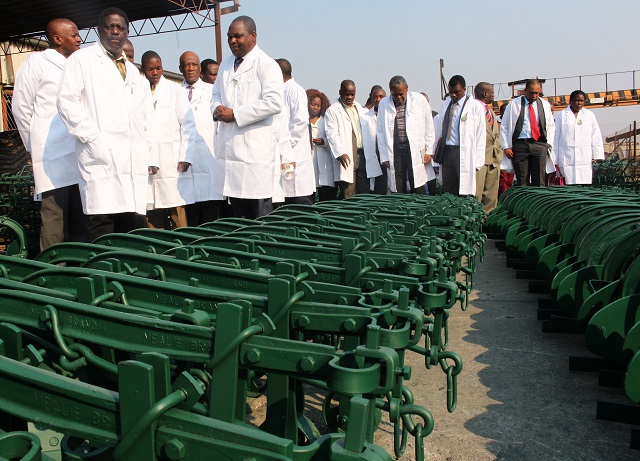Zimplow seeks products protection


Mealie Brand managing director and CZI National Council Matabeleland Chapter president, Mr Walter Chigwada (second right), takes the Minister of Industry and Commerce Mike Bimha (left) on a tour of the company in Bulawayo yesterday
Bianca Mlilo, Business Reporter
FARM implements manufacturer Zimplow Limited is lobbying the Government to include agricultural equipment and machinery under the Statutory Instrument (S.I) 64 of 2016 to protect it from cheaper imports.
Zimplow is the largest manufacturer and distributor of farming implements in sub-Saharan Africa and also manufactures and distributes metal fasteners for the mining, construction and agricultural industries.
Mr Walter Chigwada, managing director of Mealie Brand (a division of Zimplow Holdings) in Bulawayo, told Industry and Commerce Minister Mike Bimha during a tour of industries in the city that his company has fallen victim to cheaper imports.
“We came out of 2015 with the El Nino effect and the collapse of regional currencies around us and we now compete in the export market. We had a lot of stock we could sell but which recently started moving due to measures we have currently put in place,” said Mr Chigwada.
“All I’m sure of is we really need to have a statutory instrument protection. Our products unfortunately are not on the S.I.”
The Government recently promulgated S.I 64 of 2016, which prohibits open general importation of a range of products that are manufactured locally.
Among these are processed foods, building, furniture, personal care and hardware products.
As a result of the influx of cheaper finished goods, he said, they had undertaken five rationalisation exercises to do away with non-core staff and had spent a total in excess of $66 000 to protect their brand.
Mr Chigwada said their major challenge was the loss of market share. Their ploughs, he added, cost $58 each, while the imported ones are pegged at $35, equivalent to the cost of raw materials to them.
“The people we’re competing with, especially from China, just copy our designs and manufacture the stuff and bring them into our market. They have violated our patent rights by bringing the same products into our markets,” he said.
Mr Chigwada said the going had not been easy for them as they had not managed to produce a third of their normal quantities.
“We’ve only produced 7 000 implements so far but we should have done about 26 000 at this time,” he said.











Comments